Ken Champion
Reviews - Poetry
BUT BLACK & WHITE IS BETTER
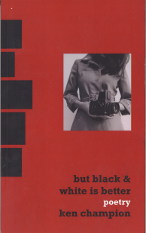
‘He is a poet of astonishing clarity, sometimes to the point of initial discomfort or shock, but he’s clever enough to know this will make his work memorable, and what will stay in the mind is both the clenched chateau-fort style and the sensitivity it permits to seep through.
Nobody writes quite like ken Champion and his originality will make him endure. This seems to me like poetry that will never go out of fashion.’
Alan Dent, Editor The Penniless Press
‘This is an outstanding debut collection with some exciting poetry. Here is a writer who deserves to reach a wider audience.’
Jim Bennett, Editor Poetry Kit
‘Throughout this book Ken Champion shows his flair for painterly detail and filmic segues of images. His voice is sardonic. He is very much his own man without any trace of influence, a fully developed style written with such ease I suspect it has taken years to perfect. There is much honesty in his work and he doesn’t shy away from primal episodes such as in the poem Dad - there’s deprivation and horror. He shares his interest in art, architecture and film, yet wears his references lightly. So much is from lived experience as the best writing is and articulated by a teasing imagination. This work is reflective of contemporary London and there are other international cities which he brings to life, and a darker side, a chiaroscuro that befits the title.’
Robert Cole, Editor Chimera
‘I've just read an excellent book of poetry by Ken Champion. All of our lives can be turned into the stuff of poetry, but Ken Champion has proved himself a master at neatly denying the expected.’
Peter Bennett, Sphinx
‘Everyday objects and occasions explode into ideas and emotions in this muscular and very welcome first full collection.’
Peter Bennett, Other Poetry Book Commendation
OF COURSE, THE YELLOW CAB: New and selected poems
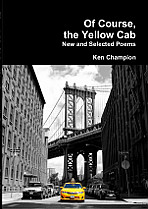
'This generous volume of 84 new and selected poems is divided into eight distinct sections and spans three continents. Not surprisingly, given Champion’s career as a lecturer in sociology, his poems are populated with people from all walks of life whose actions are keenly observed: cab drivers, street musicians, café waitresses, film crews, truck drivers and cinema usherettes ‘who see the world at 24 frames a second’.
Champion is a poet of place. We move effortlessly from Rome to Madrid, Chicago to Barcelona, London to Memphis. Each poem is a fleeting description of a specific scene, ‘finger-framed’ to focus on a defined area. There is little that escapes his attention. Beyond the people there is often a mass of architectural detail: acanthus capitals, sunray doors, latticed panes, Georgian windows, Regency houses, Victorian chimneys and the curved diamonds of the gherkin. Nowhere is this more apparent than in the poems ‘An Interest in Architecture’ and ‘Period Piece’:
They’re looking at a house, arguing whether
it’s Victorian or Edwardian – one points out the
former’s yellow stocks, slate roof, cannon head
chimneys, the other, the latter’s multi-paned sashes,
veranda, fish scale hanging tilesThese poems not only bristle with detail, they are also fast-moving. The crowding effect that they achieve leaves the reader feeling breathless. What is of particular interest is the way in which the scenes are interpreted and the characters perceived. In some instances, possible deeper narratives take the form of hypothetical inquiry.
In several of Champion’s poems considerable play is made of the contrast between movement and stasis. Many poems refer to prints, photographs, white marble, static camera shots and museums. They have a certain stillness about them and yet at the same time this stillness is also invested with movement as Champion observes the people who are caught up in the scene that he is writing about: a woman walking into a bar, his father hurling a book at the living room wall, a girl giggling into a Kodak. The play between stillness and movement is employed with skill and invention in ‘Pedestal’ where the statuesque figures in a Barcelona street are in fact not statues at all but real people who have perfected the art of standing still:
… till the chink of a coin elicits an arrogant turn of head
from a marble-veined Columbus
or a smirking salute from a copper cast G.I.In several poems Champion writes with real depth and compassion about his father. To achieve a measure of balance, a zany sense of humour is displayed in poems such as ‘Interview’ and ‘Greenfingers’. In closing, I note that in ‘Random Spanish Lesson’, Champion may even have invented a new collective noun: “a malice of poets”. Sounds ominous.'
Neil Leadbetter, Writeoutloud
'This is a comprehensive collection of Ken Champion’s poetry, and throughout he displays an eye for detail and a succinctness of description. His account of losing the end of a finger in a deckchair mishap made me squirm with discomfort; the picture of American colonels strutting round the world uses the exceptionally apt phrase “rogering the rear of Havanas”.
There is also humour, some pleasingly self-deprecating:
“In her flat they ask me what I do / I tell them I provide the lulls / in conversations at parties”.
And I won’t give it away but the last line of Anthropomothingy is one I find laugh-out-loud funny.
For subject matter Champion draws on his experience of America, his knowledge of architecture, his work in Education, but most of all on his upbringing in the East End of London. There is the angry father whose fist crashes down on the table, Auntie Joyce with her bright lipstick, and a motley crew of greyhound enthusiasts in the caff.
Underlying it all is a thread of disappointed romanticism. Whether real or imagined, whether it is one of his African students or the girl who ‘played statues’ in Barcelona, he expresses a need for female intimacy attenuated by a whiff of nostalgic regret – a “mate-less panda”. Maybe that is the lot of a poet:
“with a flat-vowelled finality / suggests I write a poem about it, / and soundlessly leaves the house.”'
Graham Buchan
CAMEO POLY
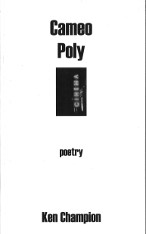
‘Ken writes with remarkable clarity. His poems achieve the memorable resolution of a Robert Doisneau photograph and his subjects are unusual and arresting. In simple language he shapes a poem that is distinctly his own. Poetry with the genuine feel of inevitability.’
Alan Dent, The Northern Review of Books
‘This is sassy, vibrant, streetwise poetry which cuts to the chase with verve and wit, fully engaged in the realities and surrealities of urban living, in the complexities of relationships…Acutely observed, these poems are sensuously engaging and likeable, like spending the evening with a good friend over a bottle of crisp wine.’
The Frogmore Papers
'…takes the reader on a roller coaster of experience. Personal favourites are the beautifully structured Partytime and the reflective Carpet… Once more bridging the continents of Europe and Africa, Cameo Poly features some true gems.'
The Ugly Tree
'I've just read an excellent book of poetry by Ken Champion, on that has a feel of genuine disclosure. Take the time that Ken went to his cousin’s house to pick up an old carpet. Not only did Ken’s cousin make him pay for the carpet, but the two were obliged to re-enact the bullying hours of their youth :
He stands as he did when we were six
and I could smell the putty on his hands
as he chopped and shaped a little house
pulling the roof off, pushing it into my face.I found myself able to wonder about that little house for longer than I expected, and the same can be said of many of the other images throughout the book. There was the time he was working on one of Barbara Streisand’s theatre productions in ‘Funny Girl’; there’s the Salsa dancer that he longs for (‘Dancing Queen’), and the film set he worked on near the Tate in ‘Mis en Scene’.
Champion spares himself the trauma of the metaphysical to enjoy a teasingly transgressive view of his own daily life. Moreover, he is a curious and precise observer of that life, whose observations don’t pretend to objectivity.
All of our lives can be turned into the stuff of poetry, but Ken Champion has proved himself a master at neatly denying the expected, and serving up well-observed vignettes with no fear of us not appreciating them.’
Peter Burnett, Sphinx
CAMEO METRO
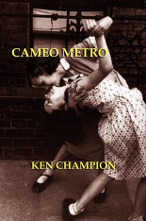
‘I really do like the poems in this book. I love the way the author brings in all the diverse connections and still opens out the poems. Brilliantly solid imagery and yet still tender verses. Am still dipping in and re-reading it, so it hasn’t made it from the armchair to the shelves yet.’
Anne Stewart, Editor poetry PF
‘I picked up Ken Champion’s second full collection with anticipation. His first, but black & white is better, has a 60’s style cover, and a sharp, laconic style which I guess owes nothing to creative writing classes and everything to life experiences. The exuberant cover of the new book harks further back to the Fifties.
Champion is at his best among London haunts admiring architecture or recalling the currency off his family’s past, counting his dad’s change in Old Money:
Finding the coins, the tuppences, two bobs
It’s t heir clink, light ales, ten woodbines,There is the same eye for detail in Aunt Rose’s Funeral:
The Benfleet Bungalow, the pampas grass
she would pick to spray with lacquer
for the vase.In Retro it’s as if you’re watching a film, as Champion gives us a wartime glimpse of his Aunt Lil:
slabbed eels twitching outside, pill box hat for
The Harold on Sunday, turban in the tractor factory
making shells, the painted line down the calf for the Rex.The cinematic quality is not surprising. The poet reveals his love of darkened afternoons at the pictures and his eye for technical detail:
then the static shot, full face looking sad
as she drives along a road, not even the upward, arcing angle of tree tops
to lessen the intensity (Afternoon Movie)There are more amused and tender observations in Usherettes:
They’ve heard the roar of light hit the screen, ping of a bra
strap from the back row, watched a lit match passed like
an Olympic flame across red velour seatsThere are his preoccupations with architecture, the past, and its movie possibilities - The ward was once a billet for men at the aerodrome / its art deco tower guiding aircraft into a black and white film - are worked into a moving poem about his dying father and their relationship, a father who had carried me on mean shoulders calling me son but never / my name, had played keeper for his regiment, hid behind trees / at the back of the school shouting dive at their feet!
(The Last Stroke)There is a story in every one of his poems and they don’t require you to worry away at their meaning. His materials are London streets, afternoon movies, fine old buildings and a vanishing or already crumbled way of life, portrayed with warmth as well as detachment.’
Greg Freeman, Writeoutloud
AFRICAN TIME
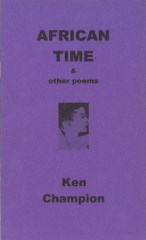
'This is a poet whose work lingers on in the mind. They intrigue and often fascinate, especially the African girl whose relationship with the writer appears as a kind of narrative interspersed with poems of irony and loss: a Wilfred Owen vignette, the surreal Anthopomorthingy and, my personal favourite, Greenfingers. An excellent collection of poetry.’
Jeanne Conn, Ed. Connections
‘A well-presented collection of breadth and thought showcasing the poet’s range…Great stuff.’
The Ugly Tree
‘An evident wit and talent are found throughout the poems.’
Envoi
‘The romance introspective and blunt - the scenery lavish, explicit and stimulating.’
Krax